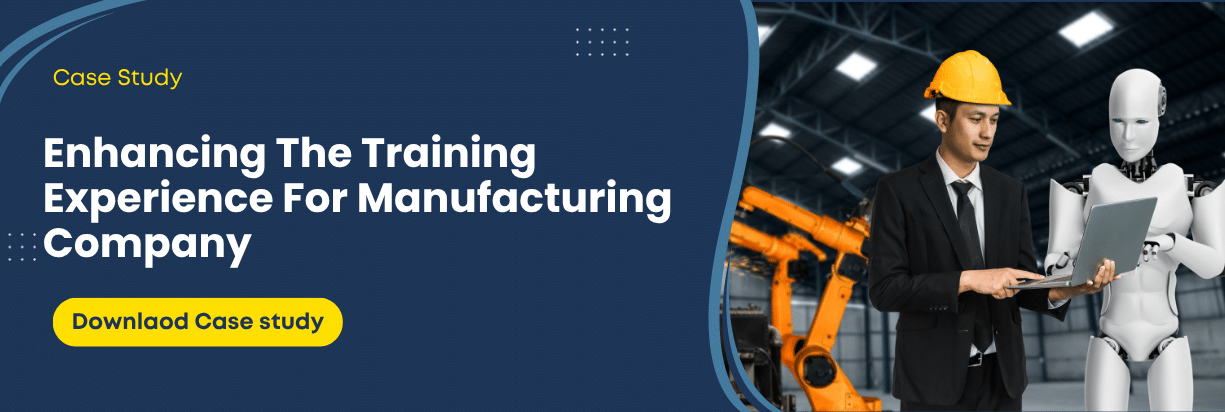In today’s rapidly evolving manufacturing industry, employee training plays a critical role in maintaining productivity, safety, and compliance. Traditional methods often fall short in meeting the demands of modern manufacturing operations.
But with the advent of AI in manufacturing employee training and Learning Management Systems (LMS), businesses can transform their training strategies, making them more efficient and effective. Let’s explore how these advanced technologies are reshaping the manufacturing training landscape.
Why Traditional Employee Training Methods Are Not Enough
Manufacturing industries require skilled employees who are not only adept at operating machinery but also capable of adapting to new technologies, systems, and processes. However, traditional training methods such as classroom sessions and manual handbooks are becoming increasingly inadequate due to:
- High Costs: On-site training can be expensive with travel, equipment, and instructor fees.
- Time-Consuming: It often takes employees away from their jobs for extended periods.
- Limited Scalability: Traditional methods struggle to accommodate a growing workforce.
- Inconsistent Training: Trainers may have varied teaching methods, leading to inconsistent results.
These challenges highlight the need for more modern, scalable, and efficient training methods like AI-powered LMS solutions.
AI and LMS: A Powerful Combination for Manufacturing Training
Integrating AI with LMS (Learning Management Systems) in manufacturing provides a transformative way to deliver personalized, data-driven, and scalable training. Here’s how:
1. Personalized Learning Paths with AI
AI in manufacturing employee training helps create personalized learning experiences for each employee. By analyzing an individual’s performance data, AI can design tailored training modules that focus on their specific skills gaps, optimizing the learning process and improving knowledge retention.
2. Real-Time Feedback and Assessment
With AI-powered LMS platforms like Paradiso LMS, manufacturers can provide immediate feedback to employees. AI tracks learners’ progress, assesses performance, and suggests improvements or additional learning materials in real-time. This ensures that employees continuously improve without waiting for traditional evaluation cycles.
3. Simulation and Virtual Training
Manufacturing environments often require hands-on training. However, setting up a physical training environment for all employees can be costly and logistically challenging. AI-powered LMS can offer virtual simulations, which allow employees to practice complex tasks in a safe, controlled, and virtual environment. This ensures employees get the experience they need without the risks associated with real-world training.
4. Scalability and Accessibility
One of the greatest advantages of AI-integrated LMS systems is scalability. Manufacturing companies can train employees at scale, no matter the size of the workforce. With Paradiso LMS, businesses can provide training to employees across multiple locations globally, allowing employees to access training content anytime, anywhere.
How Paradiso LMS Enhances Employee Training in Manufacturing
Paradiso LMS is an ideal platform for integrating AI into manufacturing training programs. It offers:
- AI-Powered Analytics: Advanced data-driven insights into learner behavior, helping companies tailor training programs effectively.
- Seamless Integration: Integration with other manufacturing systems, including HR software and ERP systems, making it easier to manage employee performance and training progress.
- Mobile Learning: Enables employees to complete training modules on their mobile devices, facilitating training on-the-go.
- Gamification: Motivates employees through interactive elements such as badges, points, and leaderboards, ensuring higher engagement and completion rates.
Real-World Case Study: Enhancing Training with Paradiso LMS
Paradiso LMS has helped numerous manufacturing companies transform their training processes. In a case study with a leading manufacturing company, Paradiso LMS enabled:
- Improved Knowledge Retention: Employees were able to retain complex technical information better with AI-assisted, personalized learning modules.
- Reduced Training Costs: The company reduced on-site training expenses significantly by shifting to online, AI-driven learning paths.
- Increased Productivity: Employees became more proficient with their skills, resulting in higher overall production rates.
This case study exemplifies how AI and LMS are revolutionizing training in the manufacturing sector, leading to greater efficiency and effectiveness.













